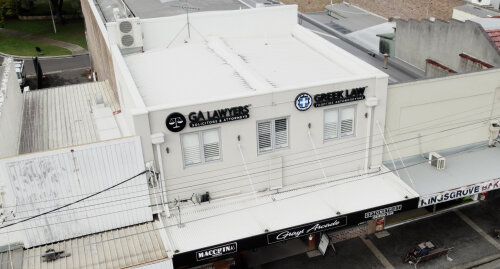Best Bad Faith Insurance Lawyers in Australia
Share your needs with us, get contacted by law firms.
Free. Takes 2 min.
Or refine your search by selecting a city:
List of the best lawyers in Australia
About Bad Faith Insurance Law in Australia
Bad faith insurance refers to instances where an insurance company unjustly refuses to pay out a claim or fails to conduct a reasonable investigation before denying a claim. In Australia, bad faith insurance is not as explicitly codified as it is in some other jurisdictions, like the United States. However, the principles of bad faith insurance are encompassed under Australian law through various statutes and common law, particularly under the banner of fair dealing. Insurance companies are expected to act in good faith and deal fairly with claimants. The Australian Securities and Investments Commission (ASIC) and the Australian Prudential Regulation Authority (APRA) regulate these principles and ensure fairness in the insurance market.
Why You May Need a Lawyer
Engaging a lawyer may be necessary if you find yourself in a dispute with an insurance company over a claim. Common situations include:
- Unreasonable delay in processing your claim.
- Denial of a valid claim without reasonable basis.
- Underpayment of a legitimate claim.
- Failure of the insurer to communicate clearly or provide valid reasons for their decisions.
- Misrepresentation of policy terms by the insurance company.
Legal assistance can provide expertise in navigating complex insurance policies, negotiation skills to settle disputes, and representation in court or mediation if necessary.
Local Laws Overview
Australia's approach to bad faith insurance is guided by both statutory and common law principles. Key aspects include:
- The Insurance Contracts Act 1984 requires insurers to act in utmost good faith towards insureds.
- Section 13 of the Insurance Contracts Act implies a duty of good faith in every insurance contract.
- The Australian Consumer Law can be relevant in cases where misleading or deceptive conduct is involved.
- Insurers must adhere to guidelines set by ASIC and APRA, which enforce standards of conduct within the industry.
These laws collectively ensure that insurers fulfill their contractual obligations and treat policyholders fairly.
Frequently Asked Questions
What constitutes bad faith by an insurance company?
Bad faith may occur when an insurer unreasonably denies a claim, delays payment, or otherwise fails to fulfill its obligations under the policy.
Can I sue my insurance company for bad faith?
Yes, you can take legal action if you believe your insurance company has acted in bad faith. Seeking legal advice is essential to understand your case specifics.
What is 'duty of utmost good faith'?
This duty requires both insurers and policyholders to act honestly and not mislead or withhold critical information that could influence the decision-making process.
How can I prove bad faith in a court of law?
Evidence may include communication records, expert testimonies, and documentation showing unreasonable denial or delay in processing a claim.
What damages can I recover if I prove bad faith?
Damages may include the initial claim amount, interest, legal costs, and potentially punitive damages depending on the jurisdiction and case specifics.
What is the role of ASIC and APRA in insurance disputes?
ASIC and APRA regulate insurance practices, ensuring compliance with laws and regulations, offering support to consumers, and taking action against misconduct.
Is mediation an option in insurance disputes?
Yes, mediation is a common approach to resolving disputes before proceeding to litigation. It involves a neutral third party to help reach a settlement.
How long do I have to file a claim for bad faith?
Time frames, known as limitation periods, vary based on jurisdictions and specific circumstances, making it important to seek timely legal advice.
What if my insurer is insolvent?
If an insurer is insolvent, other mechanisms such as industry-funded schemes might provide compensation, and legal advice is crucial in navigating these options.
Can bad faith occur with any type of insurance?
Yes, bad faith can occur in various types of insurance, including health, life, property, liability, and more.
Additional Resources
Several resources are available for individuals seeking assistance in bad faith insurance matters:
- Australian Securities and Investments Commission (ASIC) - Regulates insurance and offers guidelines for consumers.
- Australian Financial Complaints Authority (AFCA) - Provides independent dispute resolution services.
- Australian Prudential Regulation Authority (APRA) - Oversight of the financial sector, including insurance companies.
- Legal Aid Commissions - Offer free legal assistance and resources across various regions in Australia.
- Law Society or Bar Association - Can help locate specialized insurance lawyers.
Next Steps
To proceed with securing legal assistance in bad faith insurance cases, consider the following steps:
- Document Everything: Keep thorough records of all communications with your insurer, including dates, times, and what was discussed.
- Research Legal Counsel: Look for lawyers who specialize in insurance law and have experience with bad faith cases.
- Initial Consultation: Set up a consultation with a lawyer to discuss your case and understand your legal options.
- Consider Mediation: Explore mediation services as a less adversarial option before pursuing litigation.
- File a Claim: If necessary, your lawyer will guide you through the process of filing a legal claim against your insurer.
The right legal guidance can make a significant difference in resolving a bad faith insurance dispute effectively and fairly.
Lawzana helps you find the best lawyers and law firms in Australia through a curated and pre-screened list of qualified legal professionals. Our platform offers rankings and detailed profiles of attorneys and law firms, allowing you to compare based on practice areas, including Bad Faith Insurance, experience, and client feedback.
Each profile includes a description of the firm's areas of practice, client reviews, team members and partners, year of establishment, spoken languages, office locations, contact information, social media presence, and any published articles or resources. Most firms on our platform speak English and are experienced in both local and international legal matters.
Get a quote from top-rated law firms in Australia — quickly, securely, and without unnecessary hassle.
Disclaimer:
The information provided on this page is for general informational purposes only and does not constitute legal advice. While we strive to ensure the accuracy and relevance of the content, legal information may change over time, and interpretations of the law can vary. You should always consult with a qualified legal professional for advice specific to your situation.
We disclaim all liability for actions taken or not taken based on the content of this page. If you believe any information is incorrect or outdated, please contact us, and we will review and update it where appropriate.
Browse bad faith insurance law firms by city in Australia
Refine your search by selecting a city.

















